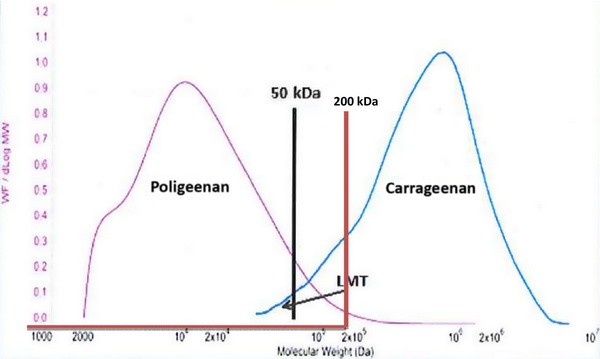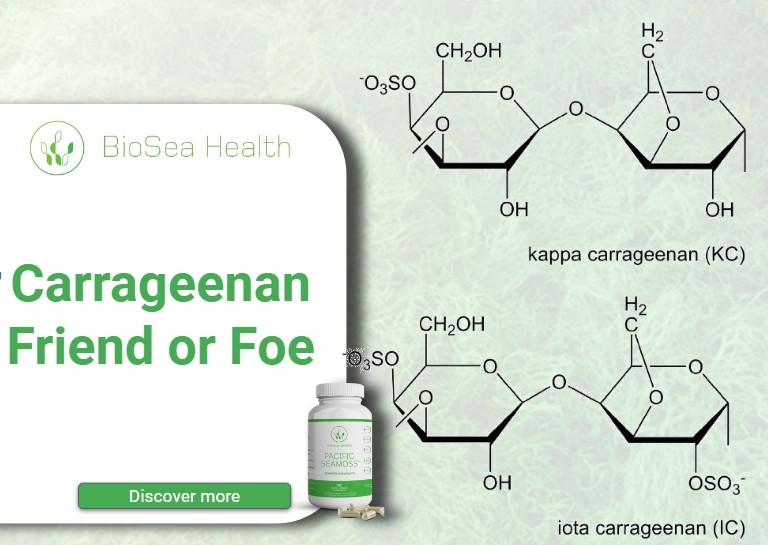Two forms of carrageenan plus one that is entirely different. What are they and how are they unique?
Carrageenan is Safe and Healthy
Carrageenan is a polysaccharide that naturally occurs in edible red seaweed
Carrageenan extract is commonly used as a food additive or thickening agent in items such as ice-cream and cheese. The United States Food and Drug Administration (FDA) have approved the additive for use.
Polysaccharides are naturally occurring carbohydrates or sugars that are cheap, non-toxic and readily available. Carrageenan is mostly used in the food industry as a gelling or thickening agent as well as in the field of pharmaceuticals to test for anti-inflammatory agents. There are many studies that have been conducted on the health effects and the safety of carrageenan. Many of these studies are based what sometimes called “degraded carrageenan”, which is in fact an entirely different molecule called Poligeenan.
- Natural carrageenan is found in whole, unprocessed seaweed such as Pacific Sea Moss which has been termed a super food. Seaweed has been the food of our ancestors for millennia.
- Food grade carageenan such as that used in the thickening of ice cream is readily extracted from red seaweed, and is processed with alkaline substances. It is approved by the United States Food and Drug Administration and also the European regulators.
- So-called denatured carrageenan is significantly altered at the molecular level with heat and acid. It is more accurately referred to as poligeenan. Poligeenan is not a food product, and only used in the lab. It is known to present considerable health risks.
Confusion between poligeenan and carrageenan
So called denatured carrageenan is in fact a different molecule which is correctly named poligeenan. Poligeenan has been extensively researched on animals and has been shown to cause ulcers and gut tumors, and even cause colon cancer in animals such as rats and mice. Few studies have been extended to humans due to these adverse effects. Poligeenan is not a food substance, it does not occur in nature, rather is is a potent chemical used in industry.
A detailed review of about 45 studies on carrageenan on animals revealed that most of these studies were based on poligeenan, which is derived from but not a form of carageenan. Poligeenan has been found to have harmful health effects. Therefore, it is important to distinguish between these different molecules.

Naturally occurring Carrageenan is good for our health
Natural carrageenan is found in Pacific Sea Moss, which is whole seaweed food and is safe for human consumption. There have been several peer-reviewed studies that support statement. In a study on mice fed on carrageenan extracted from seaweeds, inhibitory activity of tumour growth in mice was detected. In another study on male rats, there was neither detected changes in their body weights nor any change in their health. Carrageenan extracted from red marine algae is a strong anti-inflammatory agent in rodents such as mice. In yet another study, carrageenan from marine algae has shown signs of inducing cells to detect and destroy pathogens found in the body of rats. Another peer-reviewed study used a set of five rats and fed them with carrageenan extracted from red seaweed. After 10 days of observation, there was similar weight gain and fecal excretion in all the rats that were studied. There was no carrageenan detected in the liver or intestines of these rats and the carrageenan excreted in the faeces had similar gel filtration distribution pattern as that of the carrageenan that had been administered.
These studies indicate that the native carrageenan extracted from Pacific Sea Moss is entirely safe and has no negative effects. They are not degraded in the gut and therefore are not toxic. Obviously, if the good carrageenan found in Pacific Sea Moss were to be degraded in the body, it would have been detected in the numerous studies and should have resulted in significant ulceration and tumor growth.
References
[1] Re‐evaluation of carrageenan (E 407) and processed Eucheuma seaweed (E 407a) as food additives European Food Safety Commission
“Seaweed is – all the weed you will ever need.”
You might like these articles:

